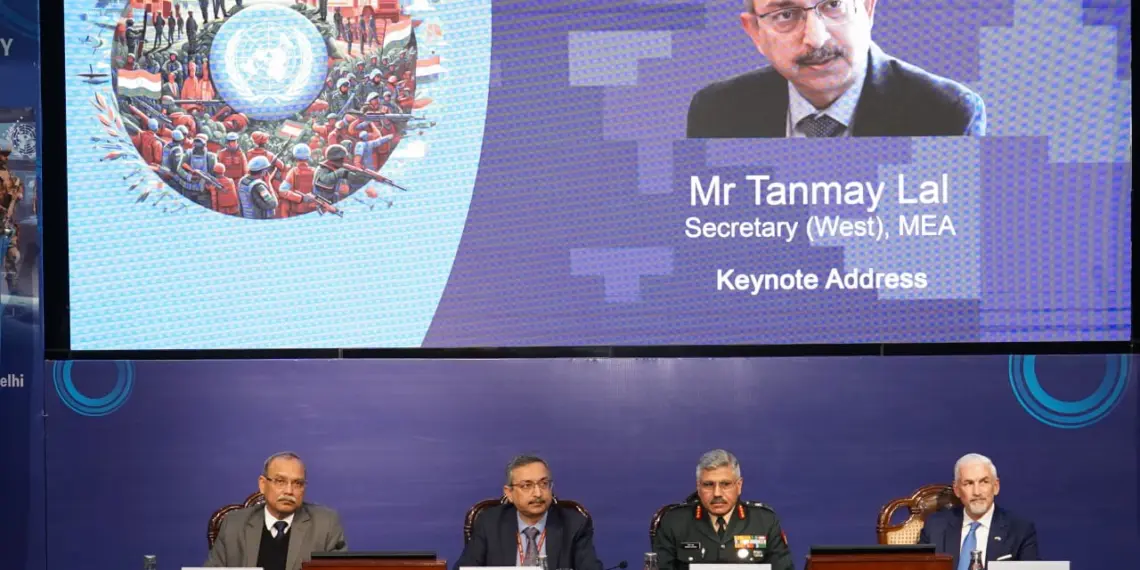A pivotal seminar titled “Adapting Modern Peacekeeping Strategies to Contemporary Threats” was held today at the Manekshaw Centre in New Delhi, organised by the Centre for United Nations Peacekeeping (CUNPK) in collaboration with the Centre for Land Warfare Studies (CLAWS). The event focused on the evolving global landscape of peacekeeping, addressing complex challenges faced by peacekeepers across the world and exploring strategies to enhance the effectiveness and sustainability of peacekeeping operations.
The keynote address was delivered by Shri Tanmay Lal, Secretary (West) of the Ministry of External Affairs, and Lieutenant General Rakesh Kapoor, Deputy Chief of Army Staff (Information Systems and Communication). The speeches underscored the changing role of peacekeepers in the modern world, highlighting the increasing demand for peacekeepers to address humanitarian concerns, contribute to community engagement, and facilitate post-conflict recovery in addition to maintaining ceasefires and containing violence.
The seminar was designed to provide a platform for exploring new strategies, lessons learned, and innovative solutions for peacekeeping operations, particularly in volatile regions like the Middle East. It also aimed to foster discussions on critical issues such as gender inclusivity, humanitarian law, education, and the future direction of peacekeeping operations in an increasingly complex global environment.
A distinguished panel of speakers contributed to the seminar, which including:
• Ms Ruchira Kamboj, Former Permanent Representative of India to the United Nations
• Ambassador DP Srivastava, Former Ambassador to Iran and Ex-Director, UNP Division, Ministry of External Affairs
• Ms Susan Ferguson, Head of UN Women, India
• Major Radhika Sen, Awarded UN Military Gender Advocate of the Year 2023
• Prof CSR Murthy, Former Professor, CIPOD, JNU
• Senior and Former Force Commanders such as Lieutenant General S Mohan, FC UNMISS; Lieutenant General Iqbal Singh Singha, Former Force Commander UNDOF; and Lieutenant General JS Lidder, Former DSRSG (P) and Force Commander UNMIS
The seminar addressed several key topics, including:
• Peacekeeping in Transition: Navigating the Complexities of a Changing Global Landscape
• Gender Inclusive Peacekeeping: The Role of Women
• The Changing Role of Female Engagement Teams in UN Peacekeeping Operations
• The Current Imbroglio in the Middle East: Impact on UN Peacekeepers and Future Prognosis
• Gaps in Regional Security Paradigms and the Impact on Operational Efficacy of Peacekeepers
• Digitisation and Infusion Technology, Renewable Energy in Peacekeeping and Protection of Civilians
The seminar was grounded in the concept that the global landscape of peacekeeping operations has evolved significantly, with new challenges emerging across conflict zones worldwide. Today, peacekeepers are expected to go beyond the traditional roles of maintaining ceasefires and containing violence. The United Nations must now address humanitarian concerns, support community engagement, and play an active role in post-conflict recovery. This seminar was an important step in exploring these new dimensions of peacekeeping and developing practical solutions for their integration into future operations.
The discussions held at the seminar are expected to contribute to future policy frameworks and operational improvements, particularly from an Indian perspective. As India has long been a significant contributor to UN peacekeeping missions, its insights and leadership are critical in shaping the future of global peacekeeping. The outcomes of the seminar will provide a roadmap for enhancing the efficacy of peacekeeping missions, ensuring that they are better equipped to address contemporary global threats.
The seminar not only highlighted the evolving challenges faced by peacekeepers but also served as a platform to explore innovative solutions aimed at making peacekeeping operations more effective and inclusive. The discussions focused on key themes such as gender inclusion, humanitarian responses, education, and the application of international law, offering actionable recommendations to redefine the strategic direction of UN peacekeeping missions.
India’s growing contribution to global peacekeeping efforts, coupled with the need for reforms within the UN system, positions the country as a key player in shaping future peacekeeping operations. The seminar’s outcomes will contribute to ensuring that peacekeepers are better equipped to tackle the complexities of modern conflicts, fostering greater resilience and innovation in peacekeeping strategies worldwide.


